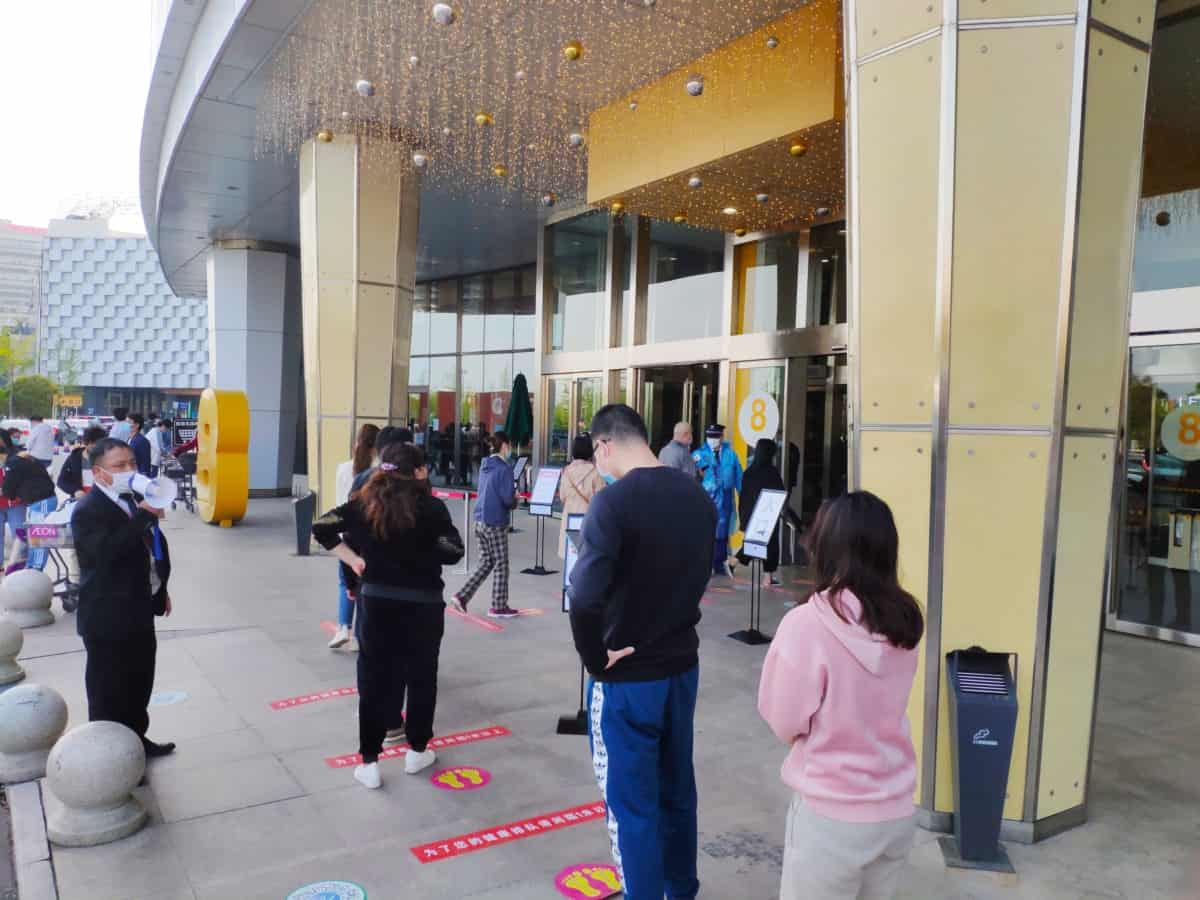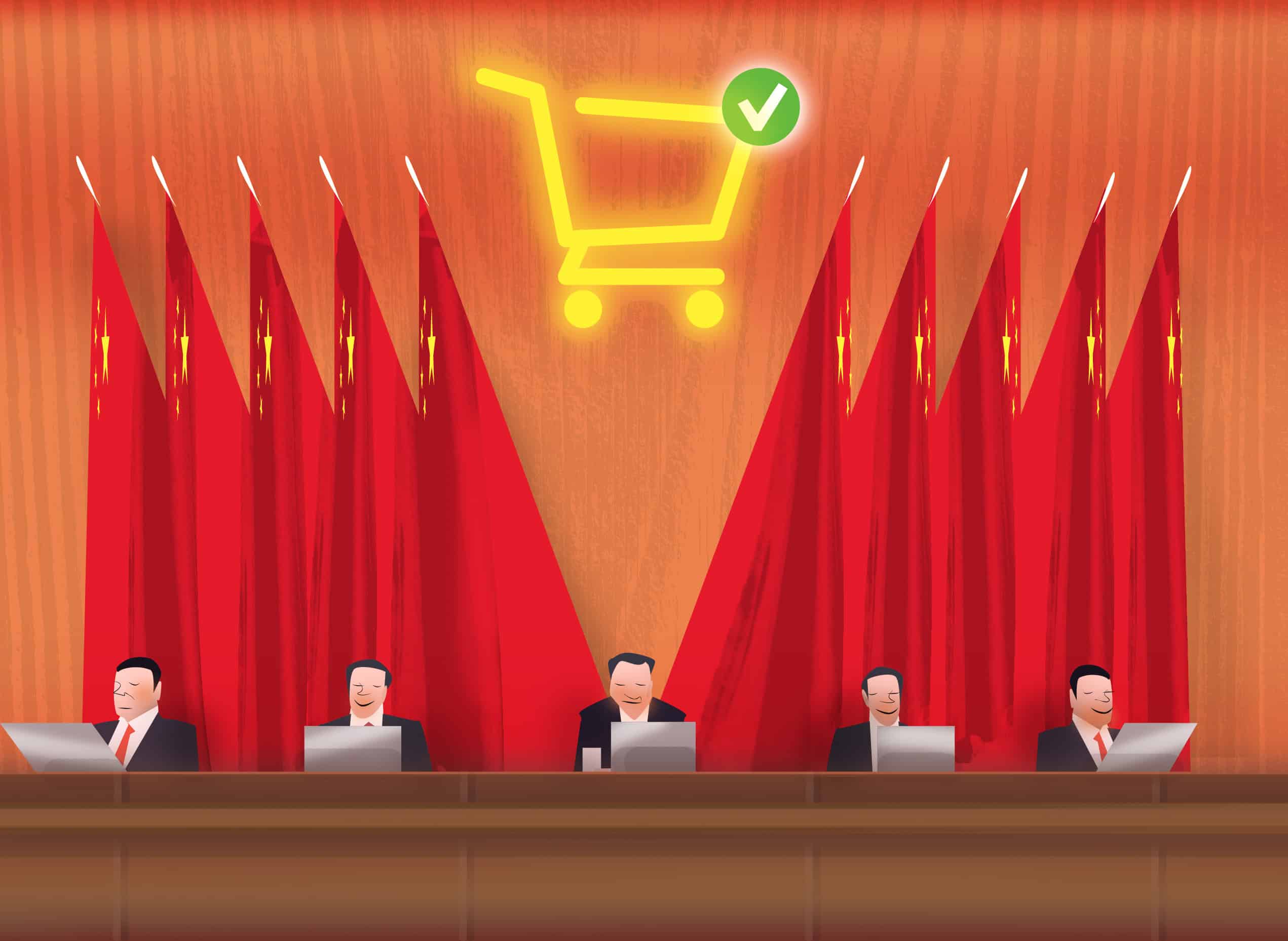- Consumer-good sales declined by 19 percent in the first quarter
- Almost one-fifth of the Chinese economy is closed — Trivium China
- First-quarter China air-passenger traffic slumped by 54 percent
- Twenty percent of U.S. companies have relocated manufacturing outside China in response to tariff increases — American Chamber of Commerce in China

Credit: Painjet, Creative Commons
Quote of the Week
The scale and breadth of China’s economic contraction are staggering. There is little prospect of China driving a revival of global growth.
Eswar Prasad, the former head of the International Monetary Fund’s China division.
Singing the Blues
Gloomy predictions and lamentations followed news that China’s economy shrank by 6.8 percent in the first quarter versus a year ago.
Don’t expect that a slowing of the pandemic will spur an economic recovery in the West. There will be more calls for direct relief to households and individuals, but don’t expect a big stimulus. A Chinese recovery will be tougher to achieve than in 2008 because of the world’s waning appetite for the country’s goods. Exports dropped by 11.4 percent in the first quarter. Global growth will likely decline by nearly 3.5 percent in 2020, the Peterson Institute said. In the first quarter, consumer prices rose 4.6 percent in urban areas and 5.9 percent in rural areas.
Small Businesses Take to the Street in Wuhan
The Communist Party is desperate to portray the recovery of Wuhan, the epicenter of the coronavirus pandemic, as a success. But a protest in the city’s commercial hub exposed tensions in the city. Police had to step in when retailers rallied to demand rent relief and greater government support for private businesses.
Almost all of the city’s large factories have reopened but only a third of small businesses are up and running. The difference has raised concerns about how quickly Wuhan’s economy can return to normal.
A Time Out for Two Start-ups
Two high-flying start-ups have been grounded. They were punished for misleading shareholders and will have no access to public markets for new funding for a year. The punishment by China’s securities regulator — for not fully disclosing links to a customer who then failed to pay its bills — is the first of its kind for companies trading on Shanghai’s high-tech STAR board.
The two companies, Ningbo Ronbay New Energy Technology and Zhejiang HangKe Technology, were told they wouldn’t be allowed to sell stocks or bonds publicly. The STAR board was launched last year as a stock venue designed for start-ups. By penalizing the companies, China is showing its fast-growing firms that it will take a tough stance on corporate disclosure. Ninety-six companies have debuted on the STAR board since July. Ningbo Ronbay and HangKe were among the first batch of 25 listings.

Credit: Andreas Praefcke , Creative Commons
Lights Dim for a Movie Empire
The real estate mogul Wang Jianlin had a dream: To dominate the global movie market. He spent billions of dollars building one of the world’s biggest cinema operators. His closely held Wanda Group owns Wanda Film Holding, the top theater chain in China, and controls AMC Entertainment, the largest in the U.S.
Wang’s dream was China’s too. And entering 2020 it was within reach. But the coronavirus intervened and now Wanda Film is struggling. This week, it reported a preliminary first-quarter loss of 550 million yuan to 650 million yuan ($92 million), compared with a profit of 400 million yuan a year earlier.
AMC said on Thursday it planned to sell $500 million of first-lien notes due 2025, in part to increase liquidity. Wanda group’s property unit also sold 5 billion yuan of notes on Thursday, Bloomberg News sources said. But it might not be enough. Social distancing will likely suppress audiences for a while.
Mastering the Shut-In Business
Some businesses are thriving during the pandemic, particularly those that benefit from people being trapped inside their homes. While technology companies around the world have cut staff, ByteDance, the Chinese start-up behind the popular short-video app TikTok, is looking to hire 10,000 new employees. It has 60,000 now.
The Beijing-based company has benefited as the coronavirus pandemic has kept many of its 1.5 billion monthly users inside, meaning more time to spend on ByteDance’s apps. TikTok’s popularity has soared as people have become addicted to uploading short clips of themselves lip-syncing to music to pass the time. TikTok has 400 million daily users in China.

Credit: Anna Hanks, Creative Commons
Just Follow the Chicken Feet
Brad W. Setser, writing for the Council on Foreign Relations, makes the argument that viruses matter more than tariffs. Viruses — bird flu, swine fever, coronavirus — have had almost as big an impact on Chinese-American trade as China’s retaliatory agricultural and seafood tariffs. The reason: workarounds and alternative markets.
In 2009, for example, the Chinese put tariffs on chicken feet imported from the U.S. in response to an American tire tariff. But while exports to China plunged, exports to Hong Kong soared. Overall, U.S. chicken exports actually rose. But the bird flu in the U.S. later did lead to a fall in American exports.
Don’t Sweat the Exports
It is taken almost as a given: In a global recession, export markets will weaken, making it harder for the economy to rise from the depths of the coronavirus pandemic. But those fears are overblown, according to researchers Nicholas R. Lardy and Tianlie Huang, who argue that exports are an exaggerated contributor to growth.
They find a more important indicator in China’s electrical power consumption, which is off only 15 percent in recent weeks, compared to 40 percent a month earlier. Since manufacturers consume 50 percent of all electricity, they see “strong evidence of the recovery of manufacturing in China.”
How Angry a Divorce?
The decoupling of the U.S. and China is a hot topic these days. Ian Bremmer and Cliff Kupchan of The Eurasia Group write that the coronavirus pandemic has dramatically accelerated and extended the separation between the two economic rivals in the manufacturing and services sectors, forcing many companies to rapidly switch supply chains, close facilities, and move staff. Trends of broader decoupling will become more deeply entrenched, while other countries will face difficulties in balancing relations with both sides.

Dave Smith covers international politics and business for The Wire’s Week in Review, and is the former editor of The New York Times Week in Review. @DaveSmithNY




